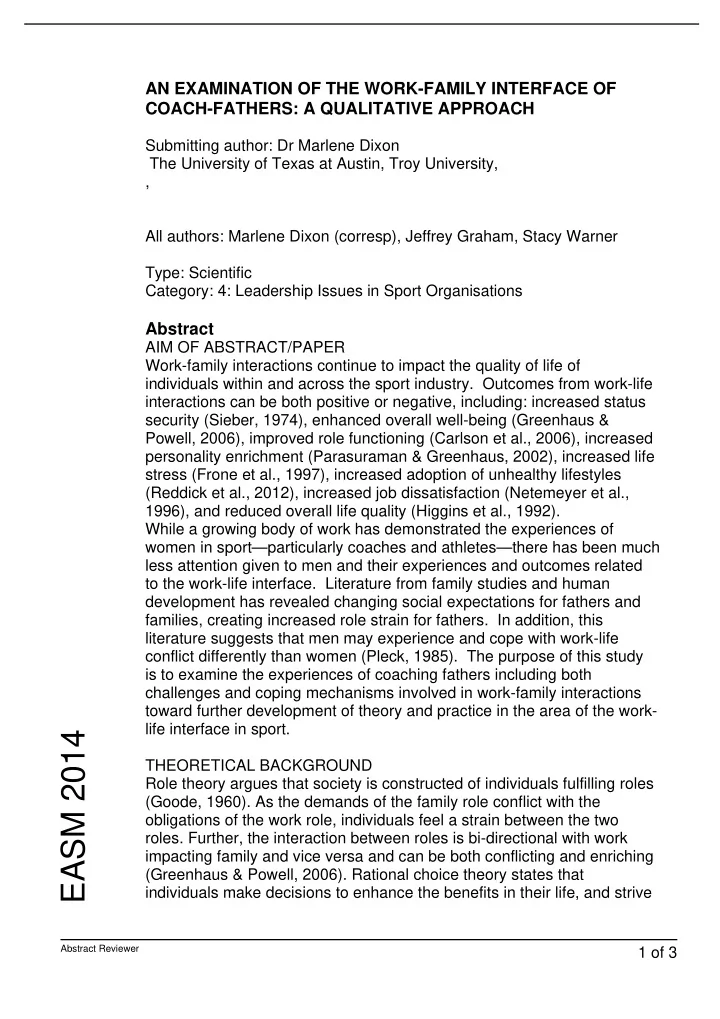

AN EXAMINATION OF THE WORK-FAMILY INTERFACE OF COACH-FATHERS: A QUALITATIVE APPROACH Submitting author: Dr Marlene Dixon The University of Texas at Austin, Troy University, , All authors: Marlene Dixon (corresp), Jeffrey Graham, Stacy Warner Type: Scientific Category: 4: Leadership Issues in Sport Organisations Abstract AIM OF ABSTRACT/PAPER � Work-family interactions continue to impact the quality of life of individuals within and across the sport industry. Outcomes from work-life interactions can be both positive or negative, including: increased status security (Sieber, 1974), enhanced overall well-being (Greenhaus & Powell, 2006), improved role functioning (Carlson et al., 2006), increased personality enrichment (Parasuraman & Greenhaus, 2002), increased life stress (Frone et al., 1997), increased adoption of unhealthy lifestyles (Reddick et al., 2012), increased job dissatisfaction (Netemeyer et al., 1996), and reduced overall life quality (Higgins et al., 1992). � While a growing body of work has demonstrated the experiences of women in sport—particularly coaches and athletes—there has been much less attention given to men and their experiences and outcomes related to the work-life interface. Literature from family studies and human development has revealed changing social expectations for fathers and families, creating increased role strain for fathers. In addition, this literature suggests that men may experience and cope with work-life conflict differently than women (Pleck, 1985). The purpose of this study is to examine the experiences of coaching fathers including both challenges and coping mechanisms involved in work-family interactions toward further development of theory and practice in the area of the work- life interface in sport. � EASM 2014 � THEORETICAL BACKGROUND � Role theory argues that society is constructed of individuals fulfilling roles (Goode, 1960). As the demands of the family role conflict with the obligations of the work role, individuals feel a strain between the two roles. Further, the interaction between roles is bi-directional with work impacting family and vice versa and can be both conflicting and enriching (Greenhaus & Powell, 2006). Rational choice theory states that individuals make decisions to enhance the benefits in their life, and strive Abstract Reviewer 1 of 3
to decrease the costs associated with obtaining those benefits (Allison, 1999). By navigating work and family demands, individuals make rational choices to maximize the benefits from one role, while reducing the negative consequences of obtaining those benefits.� Based in role theory, Graham and Dixon (in press) created a theoretical model that explored the potential tensions for contemporary fathers in a sport context. Their model suggests that there are significant and distinct challenges for sport coaches who are fathers including both structural and cultural assumptions of what it means to be a great coach that conflict with changing notions of good parenting. � � METHODOLOGY� This study, therefore, investigates the experiences of full-time employed coaches who are fathers. Following an inductive design, semi-structured in-depth interviews are being conducted with 20-25 full-time high school coaches who are fathers. Although previous research has largely focused on college coaches, this research focuses on full time high school coaches. It is expected that full-time high school coaches also experience high levels of work-family interaction, yet are more accessible for in-depth investigation. After transcription, hand coding is underway, with themes being derived from previous literature (e.g., Bruening & Dixon, 2007; Dixon & Bruening, 2007) and emerging directly from the data (Neuman, 2009).� � RESULTS, DISCUSSION AND IMPLICATIONS� Initial results indicate that coaches who are fathers perceive high work to family conflict, but little family to work conflict. This is opposite the direction reported by coaching mothers (Dixon & Bruening, 2007). Coaches reported high work time requirements from coaching and teaching duties. The coaches explained that they depend on their spouse during the season to take care of family, childcare, and household duties, but do not depend on work resources or benefits for helping reduce conflict. � Coaching fathers, similar to coaching mothers, also indicated high levels of enrichment from both their jobs and families. For example, Coach A (who had been coaching for three years) explained that his ability to relate to his own children improved because of his coaching role. Another coach reported that his family provided unconditional support, EASM 2014 which reduced stress and increased his confidence in the workplace. � Coaching fathers show higher levels of work to family conflict than coaching mothers, and they report almost no reliance on organizational supports to achieve balance. This result contrasts Bruening and Dixon’s (2007) findings regarding the support systems utilized by coaching mothers. The results also indicate that coaching fathers are concerned about the development of their children, but struggle because they perceive a lack of time and emotional resources to give to their children. Continued work in the area points to the need to develop tailored individual and organizational resources for coaching fathers to support Abstract Reviewer 2 of 3
them as they navigate the structural and cultural challenges of a sport career. References Dixon, M.A., & Bruening, J.E. (2005). Perspectives on work-family conflict in sport: An integrated approach. Sport Management Review, 8, 227-253.� Palmer, F.R., & Leberman, S.R. (2009). Elite athletes as mothers: Managing multiple identities. Sport Management Review, 12, 241-254.� Pleck, J. H. (1985). Working wives, working husbands. New York: Sage.� Schenewark, J. & Dixon, M. (2012). A dual model of work-family conflict and enrichment in collegiate coaches. Journal of Issues in Intercollegiate Athletics, 5, 15-39. EASM 2014 Abstract Reviewer 3 of 3
Recommend
More recommend